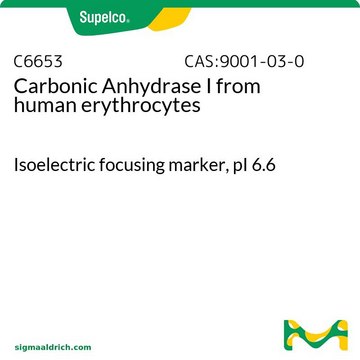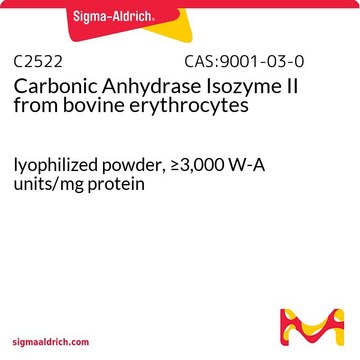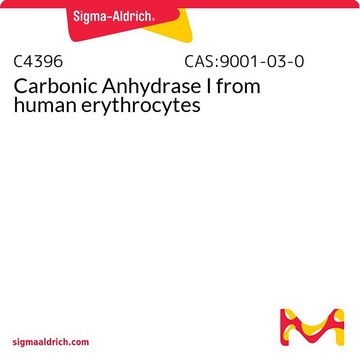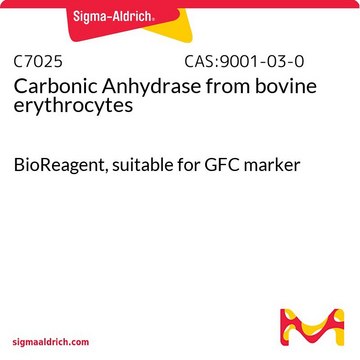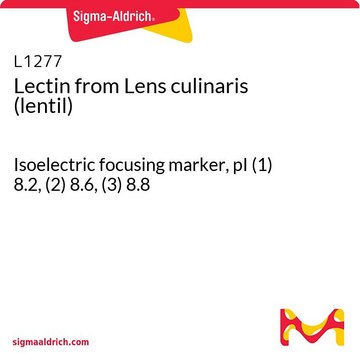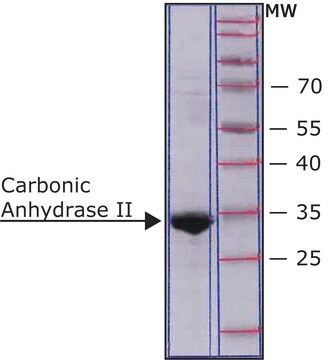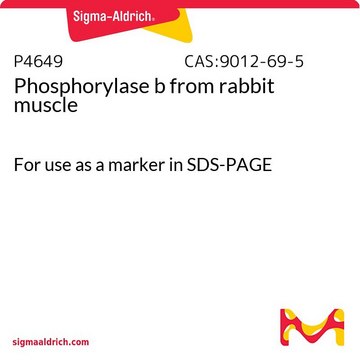C3666
Carbonic Anhydrase Isozyme II from bovine erythrocytes
Isoelectric focusing marker, pI 5.4
Synonym(s):
Carbonate Dehydratase, Carbonate Hydrolyase, Carbonic Anhydrase II
Sign Into View Organizational & Contract Pricing
All Photos(1)
About This Item
Recommended Products
Quality Level
form
powder
packaging
vial of ~1 mg protein
pI
5.4
solubility
deionized water: soluble, clear to slightly hazy, colorless (Dissolve vial contents in 0.25mL of deionised water.)
storage temp.
−20°C
Looking for similar products? Visit Product Comparison Guide
Preparation Note
Dissolve in 0.25mL of deionized water. The solution is colorless, clear to slightly hazy.
Signal Word
Danger
Hazard Statements
Precautionary Statements
Hazard Classifications
Resp. Sens. 1
Storage Class Code
11 - Combustible Solids
WGK
WGK 3
Flash Point(F)
Not applicable
Flash Point(C)
Not applicable
Personal Protective Equipment
dust mask type N95 (US), Eyeshields, Gloves
Choose from one of the most recent versions:
Already Own This Product?
Find documentation for the products that you have recently purchased in the Document Library.
Customers Also Viewed
J Gao et al.
Biophysical journal, 76(6), 3253-3260 (1999-06-04)
This paper describes the use of electrospray ionization-Fourier transform ion cyclotron mass spectrometry (ESI-FTICR-MS) to study the relative stabilities of noncovalent complexes of carbonic anhydrase II (CAII, EC 4.2.1.1) and benzenesulfonamide inhibitors in the gas phase. Sustained off-resonance irradiation collision-induced
Ryuta Saito et al.
Acta crystallographica. Section D, Biological crystallography, 60(Pt 4), 792-795 (2004-03-25)
Carbonic anhydrase (CA) is a zinc-containing enzyme that catalyzes the reversible hydration of CO2 to HCO3-. In eukaryotes, the enzyme plays a role in various physiological functions, including interconversion between CO2 and HCO3- in intermediary metabolism, facilitated diffusion of CO2
Xiuhong Shan et al.
Journal of computer assisted tomography, 37(1), 22-28 (2013-01-17)
The objective of this study was to investigate the correlation between the degree of necrosis displayed in computed tomography (CT) image and the expression of hypoxic and angiogenesis biomarkers of breast cancer. Forty-four breast cancer cases were examined with CT
Bernardo V Alvarez et al.
BMC cardiovascular disorders, 13, 2-2 (2013-01-10)
Carbonic anhydrase enzymes (CA) catalyze the reversible hydration of carbon dioxide to bicarbonate in mammalian cells. Trans-membrane transport of CA-produced bicarbonate contributes significantly to cellular pH regulation. A body of evidence implicates pH-regulatory processes in the hypertrophic growth pathway characteristic
Laurie C Hofmann et al.
Journal of experimental botany, 64(4), 899-908 (2013-01-15)
The concentration of CO(2) in global surface ocean waters is increasing due to rising atmospheric CO(2) emissions, resulting in lower pH and a lower saturation state of carbonate ions. Such changes in seawater chemistry are expected to impact calcification in
Our team of scientists has experience in all areas of research including Life Science, Material Science, Chemical Synthesis, Chromatography, Analytical and many others.
Contact Technical Service